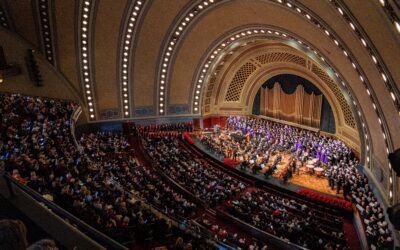On May 22 at the Michigan Theater, the Washtenaw Community Concert Band will stage a tribute to America’s first superstar bandleader, John Philip Sousa. Guest conductor Marcus Neiman will portray the man whose name is synonymous with the great American march tradition. Sousa’s success was founded on his ability to comprehend and satisfy the musical appetite of the general public by featuring popular melodies and highlights from the European classical repertoire, interspersed with encores mainly consisting of his own marches. Billed as a “Portrait of Sousa,” this free Sunday matinee offers an opportunity to experience the excitement of a live program tailored to Sousa’s specifications.
Sousa’s band visited Ann Arbor in April 1899 to perform at the U-M’s University Hall, located on the site currently occupied by Mason and Haven halls. On that occasion, Sousa introduced a new march written by sophomore music major Louis Elbel entitled “The Victors.” Neiman and the WCCB will perform Elbel’s now-ubiquitous fight song along with seven other marches including “El Capitan” (a medley of themes from Sousa’s most successful operetta), “Liberty Bell” (recognizable as the theme from Monty Python’s Flying Circus), parade ground staple “The Thunderer,” and Sousa’s masterpiece, “The Stars and Stripes Forever.”
Classical music lovers will appreciate the inclusion of Dvorak’s Slavonic Dance No. 8, Suppe’s Poet and Peasant Overture, a processional from Wagner’s Lohengrin, and the finale from Saint Saens’ Organ Symphony, featuring organist James Wagner. Soprano Mimi Lanseur, costumed as Mrs. Sousa, will sing an Irish air by Thomas Moore and two arias from Bizet’s Carmen. These colorful, sophisticated selections typify the kind of music Sousa chose to round out his concert programs.
As a direct exponent of African American culture, ragtime was looked down upon by bandleaders, academics, and journalists who objected to it being played alongside what they felt was more legitimate material. Sousa, however, said it was “an established feature of American music” and programmed his concerts accordingly. This stepping-stone towards early jazz will be represented in concert by Pryor’s cakewalk “Southern Hospitality,” with trombonist David Jackson portraying the composer. Sousa’s other star instrumentalist, Herbert L. Clarke, will be impersonated by trumpeter and WCCB conductor Chris Heidenreich. The two will share the spotlight while performing Clarke’s “Cousins.”
Sousa was contemptuous of the rapidly rising recording industry and is credited with coining the term “canned music.” (The reference was to phonograph cylinders, which came packaged in canisters.) A founding member of ASCAP, he penned an article in 1906 entitled “The Menace of Mechanical Music.” Sousa’s concern was that prerecorded music would encourage copyright infringement, shrink the audience for live entertainment, and ultimately cause people to forget how to make music together. While this might seem like archaic resistance to inevitable progress, consider the continuing controversy over online audio file sharing and the drastic reduction in funds for musical education in our public schools. Food for thought.


